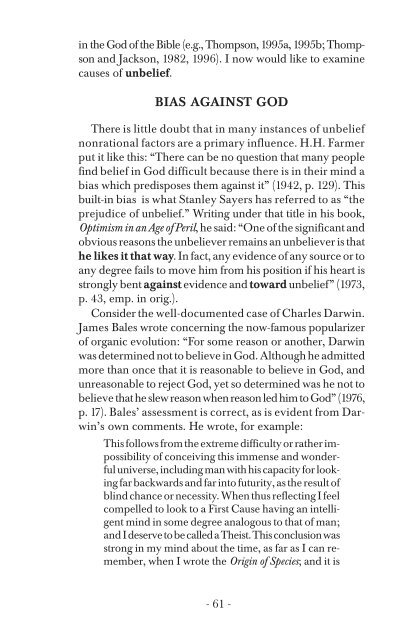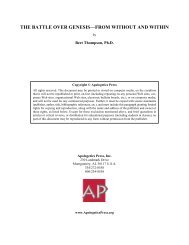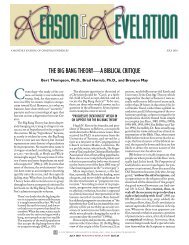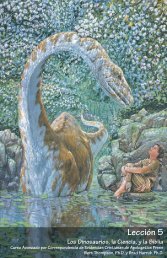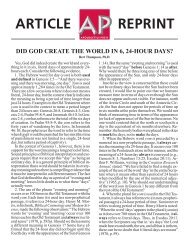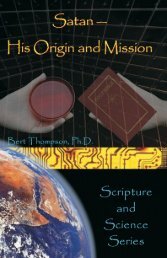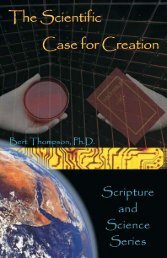The Many Faces, and Causes, of Unbelief - Apologetics Press
The Many Faces, and Causes, of Unbelief - Apologetics Press
The Many Faces, and Causes, of Unbelief - Apologetics Press
You also want an ePaper? Increase the reach of your titles
YUMPU automatically turns print PDFs into web optimized ePapers that Google loves.
in the God <strong>of</strong> the Bible (e.g., Thompson, 1995a, 1995b; Thompson<br />
<strong>and</strong> Jackson, 1982, 1996). I now would like to examine<br />
causes <strong>of</strong> unbelief.<br />
BIAS AGAINST GOD<br />
<strong>The</strong>re is little doubt that in many instances <strong>of</strong> unbelief<br />
nonrational factors are a primary influence. H.H. Farmer<br />
put it like this: “<strong>The</strong>re can be no question that many people<br />
find belief in God difficult because there is in their mind a<br />
bias which predisposes them against it” (1942, p. 129). This<br />
built-in bias is what Stanley Sayers has referred to as “the<br />
prejudice <strong>of</strong> unbelief.” Writing under that title in his book,<br />
Optimism in an Age <strong>of</strong> Peril, he said: “One <strong>of</strong> the significant <strong>and</strong><br />
obvious reasons the unbeliever remains an unbeliever is that<br />
he likes it that way. In fact, any evidence <strong>of</strong> any source or to<br />
any degree fails to move him from his position if his heart is<br />
strongly bent against evidence <strong>and</strong> toward unbelief” (1973,<br />
p. 43, emp. in orig.).<br />
Consider the well-documented case <strong>of</strong> Charles Darwin.<br />
James Bales wrote concerning the now-famous popularizer<br />
<strong>of</strong> organic evolution: “For some reason or another, Darwin<br />
was determined not to believe in God. Although he admitted<br />
more than once that it is reasonable to believe in God, <strong>and</strong><br />
unreasonable to reject God, yet so determined was he not to<br />
believe that he slew reason when reason led him to God” (1976,<br />
p. 17). Bales’ assessment is correct, as is evident from Darwin’s<br />
own comments. He wrote, for example:<br />
This follows from the extreme difficulty or rather impossibility<br />
<strong>of</strong> conceiving this immense <strong>and</strong> wonderful<br />
universe, including man with his capacity for looking<br />
far backwards <strong>and</strong> far into futurity, as the result <strong>of</strong><br />
blind chance or necessity. When thus reflecting I feel<br />
compelled to look to a First Cause having an intelligent<br />
mind in some degree analogous to that <strong>of</strong> man;<br />
<strong>and</strong> I deserve to be called a <strong>The</strong>ist. This conclusion was<br />
strong in my mind about the time, as far as I can remember,<br />
when I wrote the Origin <strong>of</strong> Species; <strong>and</strong> it is<br />
-61


